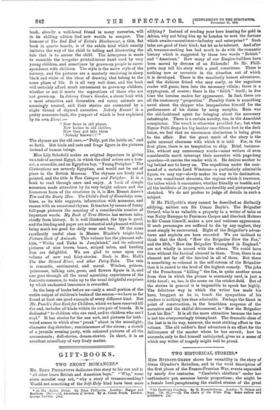GIFT-BOOKS.
TWO SHORT ROMANCES.*
Ma. EDEN Puruxbrrs dedicates this story to his son and tc "all other brave British and American boys." "Why," some stern moralist may ask, "why a story of treasure-seeking ? Would not something of the Self-Help kind have been more • (1) Ti,, Golden Fetich. By Eden Phillpotts. London: Harper and Brothers. (69.)—(21 Adventures of Gerard. By A. Conan Doyle. London, George Newnes. [Ss.] edifying ? Instead of sending your hero hunting for gold in Africa, why not bring him up to London to seek the fortune which awaits—sometimes—industry and enterprise ? " Such tales are good of their kind; but let us be tolerant. And after all, treasure-seeking has had much to do with the romantic history which is suggested by those two words "British" and "American." How many of our Empire-builders havo been moved by dreams of an Eldorado! So Mr. Phill- potts may tell his story with a good conscience. There is nothing new or eccentric in the situation out of which it is developed. There is the manifestly honest adventurer, and the dubious friend who may easily, as the sagacious reader will guess, turn into the necessary villain; there is a cryptogram, of course; there is the " fetich " itself; in due time the heroine makes her appearance. In fact, there are all the customary "properties." Possibly there is something novel about the skipper who incapacitates himself for the performance of his duties by using morphia. Rum was the old-fashioned agent for bringing about the necessary catastrophe. There is a certain novelty, too, in the Anarchist conspirator. The wreck is otherwise provided for; but when Signor Polti drops his big leather case fifteen feet to the deck below, we feel that an uncommon distinction is being given to the affair. But the great merit of the story is the quite unusual clearness with which it is told. For, in the first place, there is no temptation to skip. Brief, business- like, without any unnecessary words—some writers of even considerable merit interrupt their narrative with page-long speeches—it carries the reader with it. He desires neither to lag behind nor to hurry on. The expedition under the com- mand of a certain Lord Winstone—a particularly admirable figure, we may say—slowly makes its way to its destination. Its own constituent elements, the regions which it traverses, the tribes which it encounters, whether friendly or hostile, and all the incidents of its progress, are forcibly and picturesquely sketched. We do not profess to judge of details in such a subject If Mr. Phillpotts's story cannot be described as distinctly edifying, neither can Sir Conan Doyle's. The Brigadier Gerard, who is as valuable a property to a writer of tales as was Natty Bumppo to Fenimore Cooper and Sherlock Holmes to Sir Conan himself, makes a new and welcome appearance. If such personages are suffered to die by any neglect, they must simply be resurrected. Eight of the Brigadier's adven- tures and exploits are here recorded. We are inclined to think that the third, "How the Brigadier Slew the Fox," and the fifth, "How the Brigadier Triumphed in England," are not wholly in accord with the others. We could have done without the farcical element in them. True, there is an element not far off the farcical in all of them. But there is something so colossal in the self-esteem of the Brigadier that it is raised to the level of the highest comedy. The joke of the Frenchman " killing " the fox, in quite another sense from that in which the phrase is commonly used, is just a little banal; so, too, is the scene on the cricket-field. But of the stories in general it is impossible to speak too highly. The felicitous way in which the writer has made his hero, braggart as he is, touch the sympathies of his readers is nothing less than admirable. Perhaps the finest in point of construction, in the breathless suspense of the narrative and the skilful denouement, is "How the Brigadier Lost his Ear." It is all the more attractive because the hero is not too overpoweringly triumphant. The dramatic close of the last is in its way, however, the most striking effect in the volume. The old soldier's final adventure is an effort for the deliverance of the master whom he has served; how he succeeds, only to find himself anticipated, gives us a scene of which any writer of tragedy might well be proud.


























































 Previous page
Previous page